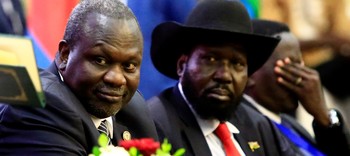South Sudan peace arrangements 'not realistic' – Troika

The United States, Britain and Norway on Friday said considerable challenges lie ahead of South Sudan’s peace agreement, citing unrealistic arrangements.
After years of fighting, President Salva Kiir and opposition groups signed a peace deal in the Sudanese capital Khartoum last Sunday.
In a joint statement seen by Radio Tamazuj, the Troika said it is concerned that the arrangements agreed to date are not realistic or sustainable. “Given their past leadership failures, South Sudanese leaders will need to behave differently and demonstrate commitment to peace and good governance,” partly reads the Troika statement.
The three countries called on the parties to develop clear and realistic governance and security timelines and plans for the transition period, and on the Intergovernmental Authority on Development member states and the AU to continue and intensify their involvement in the implementation phase of any agreement.
They further said they support the people of South Sudan’s aspirations to lead lives unburdened by fear, and to experience peace, pluralism, and prosperity.
“We remain steadfast that the best hope for sustainable peace is a process inclusive of ordinary men and women, civil society, religious leaders, ethnic minorities, and other excluded groups,” the group said.
The Troika urged mediators to ensure the open and free participation of groups and other participants in the negotiations, to ensure their interests are fully protected.
“During the next stage of the talks, parties must bring in a wider range of stakeholders, and develop clear plans for the transition period, including how resources will be used in a transparent and accountable way for the benefit of all South Sudanese. Critical questions remain, such as how security will be provided in Juba during the transition period and how meaningful checks will be placed on executive power,” the three countries said.
The group pointed out that sustained peace is a necessary condition for the legitimacy of a transitional arrangement, while calling on regional partners to uphold the United Nations Security Council arms embargo and on their financial institutions to ensure that the proceeds from corrupt and war-making activities do not flow through their jurisdictions.